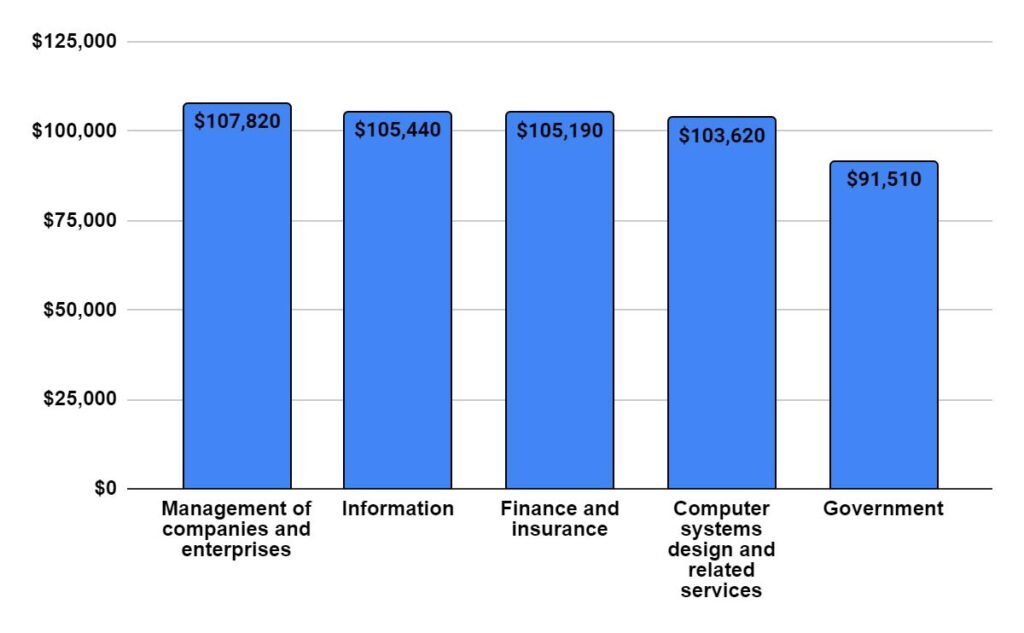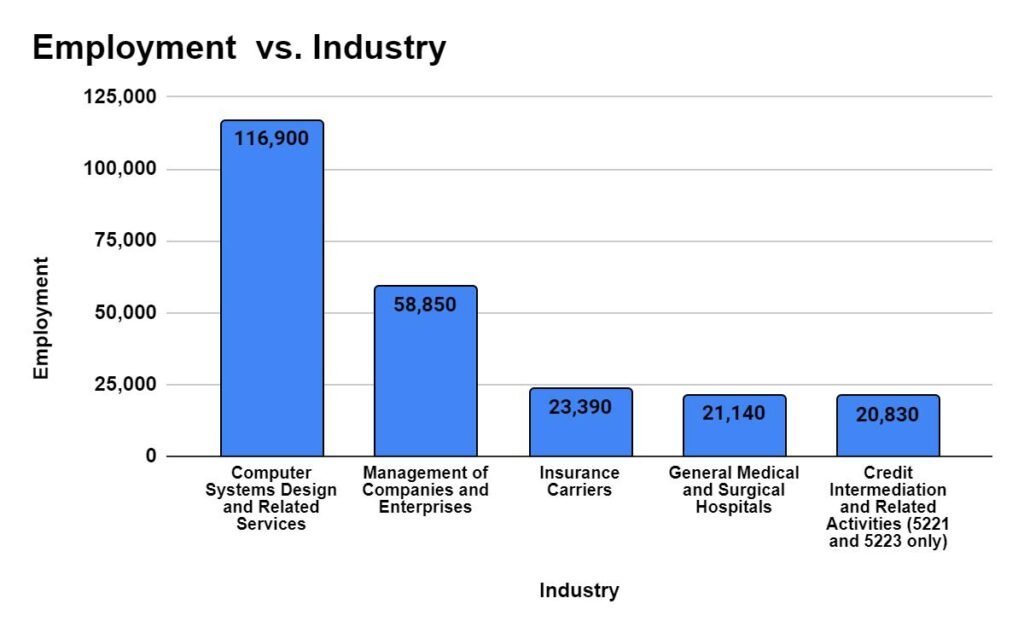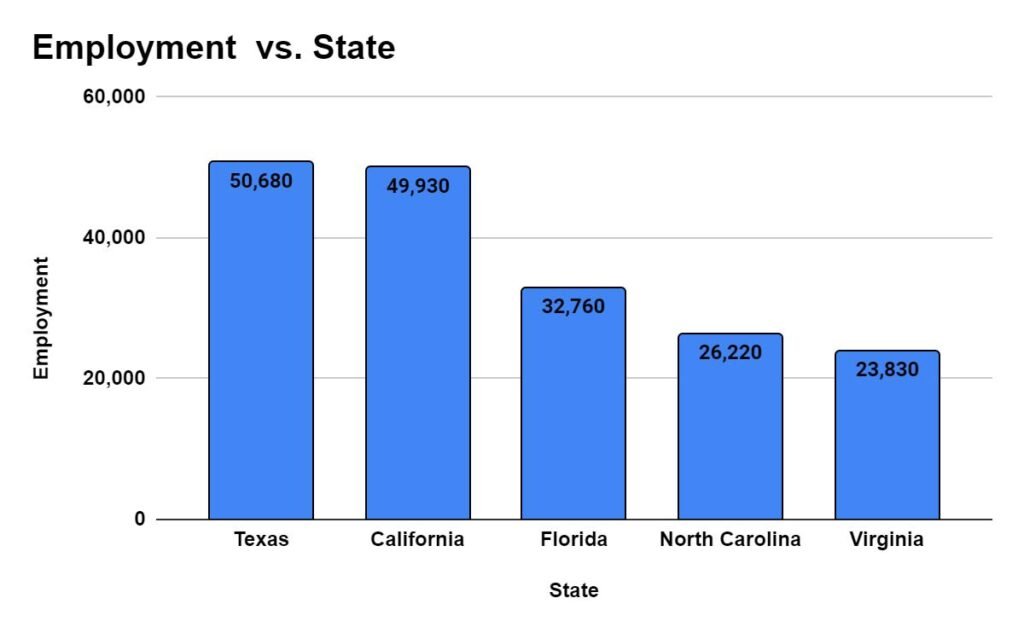Computer Systems Analysts play a major role in bridging the gap between an organization’s technological needs and its business objectives.
But how much do Systems Analysts earn? Let’s delve into the world of Computer Systems Analyst salaries in the USA.
This article explores the Computer Systems Analysts wages in United States Of America, exploring the factors that influence your earning potential and offering tips to maximize Computer Systems Analysts income in this dynamic field.
Defining the Computer Systems Analysts:
Computer Systems Analysts are the tech expert. They joint the business world and the world of technology, analyzing current systems, designing improvements, and implementing solutions to meet evolving needs.

- Computer Systems Analysts Salary Range
- Top Paying Industries for Computer Systems Analysts
- Top Paying U.S. States for Computer Systems Analysts
- Computer Systems Analysts Take-Home Pay
- Expenses and Savings Potential Estimates in USA
- Beyond the Base Salary
- Factors Affecting Computer Systems Analysts Income
- Boosting Computer Systems Analysts Salary: Skills and Tips
Computer Systems Analysts Salary Range
According to the U.S. Bureau of Labor Statistics1, the annual median salary for Computer Systems Analysts is $ 103,800. Computer Systems Analysts earn salaries ranging from $63,230 to $165,700 annually.
Top 10% earners: Exceed $165,700 annually
Bottom 10% earners: Make less than $63,230 annually
Projected annual median salary for Computer Systems Analysts in 2024-2025 (with 2.5% increase) is $106,395.
The median annual wages for Computer Systems Analysts in the Top industries

Chart 1: Median annual wages for Computer Systems Analysts in the top industries (U.S. BLS May 20232)
This wide range highlights the diverse factors that influence a Computer Systems Analysts income in USA. We will be discussing those factors below.
Top Paying Industries for Computer Systems Analysts
The U.S. Bureau of Labor Statistics (BLS) data reveals that Computer Systems Analysts working for Personal Services earn the highest annual salaries, exceeding $ 174,000 annually (U.S BLS May 20233).
Other high-paying industries in USA includes Computer and Peripheral Equipment Manufacturing etc.
| Industry | Hourly mean wage | Annual mean wage |
| Personal Services | $ 83.89 | $ 174,490 |
| Computer and Peripheral Equipment Manufacturing | $ 76.08 | $ 158,240 |
| Web Search Portals, Libraries, Archives, and Other Information Services | $ 75.27 | $ 156,560 |
| Food and Beverage Retailers (4451 and 4452 only) | $ 72.09 | $ 149,950 |
| Audio and Video Equipment Manufacturing | $ 69.25 | $ 144,040 |
Industry with highest Employment Level for Computer Systems Analysts
Most number of Computer Systems Analysts are employed in Computer Systems Design and Related Services, followed by Management of Companies and Enterprises etc.

Chart 2: Industry with highest employment level for Computer Systems Analysts
Top Paying U.S. States for Computer Systems Analysts
Washington leads the pack with the highest annual mean wage for Computer Systems Analysts in USA. Following closely are Delaware and California all offering wages exceeding $132,000 annually (U.S BLS4).
| State | Hourly mean wage | Annual mean wage |
| Washington | $ 63.83 | $ 132,760 |
| Delaware | $ 63.28 | $ 131,620 |
| California | $ 62.22 | $ 129,420 |
| New Jersey | $ 60.69 | $ 126,240 |
| Massachusetts | $ 60.04 | $ 124,870 |
U.S. States with the highest employment level for Computer Systems Analysts
New York leads in providing employment to the Computer Systems Analysts, followed by California and Texas.

Chart 3: States with the highest employment level for Computer Systems Analysts
Computer Systems Analysts Take-Home Pay
After factoring in federal and state taxes, a Computer Systems Analysts with a state-wise annual mean salary, would have an estimated net income as follows:
Taxes and take home pay estimate for a single filer
Florida: $106,050 (Annual mean wage) – $15,591 (Estimated income tax) = $90,459 (Estimated take home pay).
California: $129,420 (Annual mean wage) –$29,429 (Estimated income tax) = $99,991 (Estimated take home pay).
Texas: $115,240 (Annual mean wage) – $17,733 (Estimated income tax) = $97,507 (Estimated take home pay).
More taxes can be saved by contributions in IRA, retirement, itemized deduction such as charitable contributions, medical and dental expenses.
Expenses and Savings Potential Estimates in USA
The average annual expenses for a single person household in California are estimated at $48,163 excluding taxes, according to estimates from the Massachusetts Institute of Technology5. (The figures are measured in 2023 inflation-adjusted dollars)
Based on this estimate, a Computer Systems Analysts earning the take home pay of $129,420, with basic expenses could potentially save $81,257 annually. It’s important to note that individual expenses can vary significantly depending on lifestyle choices and location.
Savings for Married Couples/Households:
While the data provided doesn’t explicitly detail salary savings for married couples or households, it’s important to consider that combined incomes and potentially shared expenses could significantly increase overall savings potential in USA.
Beyond the Base Salary
Total compensation for Computer Systems Analysts goes beyond the hourly or annual wage. Organizations offer additional benefits such as:
Housing stipends: Provides financial support for housing during your placement.
Meal stipends: To help with daily meals.
Travel allowances: To reimburse travel expenses incurred during relocation.
Health insurance: Comprehensive health insurance coverage for you and your dependents.
Paid time off: Vacation days and sick leave.
Childcare assistance: Childcare assistance programs help employees manage this significant expense.
Life insurance: This benefit provides financial protection for an employees family in the event of their death.
Disability insurance: This benefit provides income to an employee who is unable to work due to a disability.
Continuing education reimbursement: Support for professional development and training.
Retirement savings plans: Retirement planning gets a helping hand with employer-sponsored plans like 401(k)s. These plans offer tax advantages for saving. Employers may also match employee contributions.
Factors Affecting Computer Systems Analysts Income
Several factors can affect Computer Systems Analysts paycheck:
Experience: As with most professions, experience plays a significant role in determining salary. Entry-level specialists can expect lower salaries, while seasoned professionals with proven track records command higher compensation.
Education and Certifications: Certifications and advanced degrees can boost a Computer Systems Analyst’s marketability and command higher salaries. Certifications such as the Certified Systems Analyst Professional (CSAP) or the Certified Software Systems Analyst (CSSA) demonstrate specialized knowledge and expertise.
Location: Geographic location significantly impacts Computer Systems Analysts salaries. U.S. States like Washington, Delaware, and California offer some of the highest pay, while others may offer lower wages.
Industry: The industry you work in can impact your salary. Personal Services generally offer the highest wages.
Employer: Working for a large tech or a reputed consulting firm might offer higher compensation packages compared to smaller firms.
Contract Details: The specific terms of the employment contract, including factors like housing stipends, overtime pay, and benefits, can affect the overall compensation package.
Boosting Computer Systems Analysts Salary: Skills and Tips
So, how can Computer Systems Analysts maximize their salary? Here are some tips:
Skills and Certifications: Strengthen your understanding of system analysis methodologies, network protocols, and database management, can increase earning potential.
Negotiate Your Salary: Don’t be afraid to negotiate your salary during the job offer stage. Research market rates for Computer Systems Analysts with your experience and qualifications.
Network & Build Relationships: Networking with other professionals analysts, attend industry events, and build your professional network. This can open doors to new opportunities and competitive salaries.
Build a Strong Portfolio: Showcase your work through projects you’ve undertaken, highlighting your problem-solving and analytical skills.
Continue Learning: Stay up-to-date with the latest advancements in your field by attending conferences and pursuing training opportunities.
Conclusion:
A career as a Computer Systems Analysts in United States offers both professional satisfaction and the potential for a high salary. By understanding the various factors that influence salary and carefully managing expenses, Computer Systems Analysts can make informed decisions and pave the way for a rewarding and financially secure career path.
Share this Post
Computer Programmers Salaries USA 2024: States and Industry
Software Developers Salaries USA 2024: States and Industry
Web Developers Salaries USA 2024: States and Industry
Note:
This article provides general information only and should not be considered financial advice: Your individual circumstances and specific job offer details will significantly impact your actual earnings.
Thorough research is crucial: Research job postings thoroughly and be prepared to negotiate your contract terms.
Seek professional guidance: Consulting with a financial advisor can provide personalized advice on managing your finances and maximizing your savings potential.
Conduct extensive research: By carefully considering the factors mentioned in this article and conducting thorough research, you can confidently navigate your career path as a Computer Systems Analysts.
- U.S. Bureau of Labor Statistics: https://www.bls.gov/oes/current/oes151211.htm#st ↩︎
- U.S. Bureau of Labor Statistics: https://www.bls.gov/ooh/computer-and-information-technology/computer-systems-analysts.htm#tab-5 ↩︎
- U.S. Bureau of Labor Statistics: https://www.bls.gov/oes/current/oes151211.htm#st ↩︎
- U.S. Bureau of Labor Statistics: https://www.bls.gov/oes/current/oes151211.htm#st ↩︎
- Massachusetts Institute of Technology: https://livingwage.mit.edu/states/06 ↩︎



